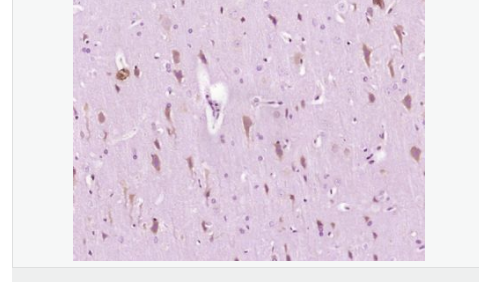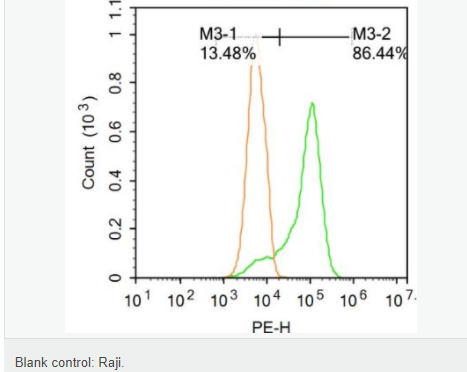

貨號
產品規格
售價
備注
BN41967R-50ul
50ul
¥1486.00
交叉反應:Human,Rat(predicted:Mouse,Dog,Pig,Cow,Horse,Rabbit) 推薦應用:WB,IHC-P,IHC-F,ICC,IF,Flow-Cyt,ELISA
BN41967R-100ul
100ul
¥2360.00
交叉反應:Human,Rat(predicted:Mouse,Dog,Pig,Cow,Horse,Rabbit) 推薦應用:WB,IHC-P,IHC-F,ICC,IF,Flow-Cyt,ELISA
BN41967R-200ul
200ul
¥3490.00
交叉反應:Human,Rat(predicted:Mouse,Dog,Pig,Cow,Horse,Rabbit) 推薦應用:WB,IHC-P,IHC-F,ICC,IF,Flow-Cyt,ELISA
產品描述
| 英文名稱 | IRE1 |
| 中文名稱 | 內質網核信號轉導蛋白a1抗體 |
| 別 名 | IRE1a; Endoplasmic reticulum (ER) to nucleus signalling 1; Endoplasmic reticulum to nucleus signaling 1; Endoplasmic reticulum-to-nucleus signaling 1; Endoribonuclease; ER to nucleus signaling 1; ERN 1; ERN1; ERN1_HUMAN; hIRE 1p; hIRE1p; Inositol requiring 1; Inositol requiring protein 1; Inositol-requiring protein 1; IRE-1; IRE 1; IRE 1a; IRE 1P; Ire1 alpha; Ire1-alpha; Ire1alpha; IRE1P; MGC163277; Protein kinase/endoribonuclease; Serine/threonine protein kinase/endoribonuclease IRE1. |
| 研究領域 | 細胞生物 信號轉導 激酶和磷酸酶 |
| 抗體來源 | Rabbit |
| 克隆類型 | Polyclonal |
| 交叉反應 | Human, Rat, (predicted: Mouse, Dog, Pig, Cow, Horse, Rabbit, ) |
| 產品應用 | ELISA=1:5000-10000 IHC-P=1:100-500 IHC-F=1:100-500 Flow-Cyt=1ug/test ICC=1:100-500 IF=1:100-500 (石蠟切片需做抗原修復) not yet tested in other applications. optimal dilutions/concentrations should be determined by the end user. |
| 分 子 量 | 105kDa |
| 細胞定位 | 細胞漿 細胞膜 |
| 性 狀 | Liquid |
| 濃 度 | 1mg/ml |
| 免 疫 原 | KLH conjugated synthetic peptide derived from human IRE1a:252-260/977 |
| 亞 型 | IgG |
| 純化方法 | affinity purified by Protein A |
| 儲 存 液 | 0.01M TBS(pH7.4) with 1% BSA, 0.03% Proclin300 and 50% Glycerol. |
| 保存條件 | Shipped at 4℃. Store at -20 °C for one year. Avoid repeated freeze/thaw cycles. |
| PubMed | PubMed |
| 產品介紹 | The protein encoded by this gene is the ER to nucleus signalling 1 protein, a human homologue of the yeast Ire1 gene product. This protein possesses intrinsic kinase activity and an endoribonuclease activity and it is important in altering gene expression as a response to endoplasmic reticulum-based stress signals. [provided by RefSeq, Jul 2008] Function: Senses unfolded proteins in the lumen of the endoplasmic reticulum via its N-terminal domain which leads to enzyme auto-activation. The active endoribonuclease domain splices XBP1 mRNA to generate a new C-terminus, converting it into a potent unfolded-protein response transcriptional activator and triggering growth arrest and apoptosis. Subunit: Homodimer; disulfide-linked. Dimer formation is driven by hydrophobic interactions within the N-terminal luminal domains and stabilized by disulfide bridges. Also binds HSPA5, a negative regulator of the unfolded protein response. This interaction may disrupt homodimerization and prevent activation of ERN1. Interacts with TAOK3 and TRAF2. Subcellular Location: Endoplasmic reticulum membrane. Tissue Specificity: Ubiquitously expressed. High levels observed in pancreatic tissue. Post-translational modifications: Autophosphorylated. Similarity: Belongs to the protein kinase superfamily. Ser/Thr protein kinase family. Contains 1 KEN domain. Contains 1 protein kinase domain. SWISS: O75460 Gene ID: 2081 Database links: Entrez Gene: 2081 Human Entrez Gene: 78943 Mouse Omim: 604033 Human SwissProt: O75460 Human SwissProt: Q9EQY0 Mouse Unigene: 133982 Human Unigene: 592041 Human Unigene: 700027 Human Unigene: 20452 Mouse Unigene: 340943 Mouse Unigene: 226435 Rat Important Note: This product as supplied is intended for research use only, not for use in human, therapeutic or diagnostic applications. |

